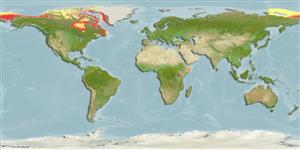Teleostei (teleosts) >
Perciformes/Cottoidei (Sculpins) >
Cottidae (Sculpins)
Etymology: Myoxocephalus: Greek, myos = muscle, and also, mouse + Greek, kephale = head (Ref. 45335).
Environment: milieu / climate zone / depth range / distribution range
Ecology
Marine; brackish; demersal; depth range 0 - 280 m (Ref. 117245). Polar; 83°N - 49°N, 142°E - 45°W (Ref. 117245)
Arctic: to James Bay and Straits of Belle Isle in Canada and Greenland.
Size / Weight / Age
Maturity: Lm ? range ? - ? cm
Max length : 22.0 cm TL male/unsexed; (Ref. 7251)
Dorsal spines (total): 8 - 9; Dorsal soft rays (total): 14 - 17; Anal spines: 0; Anal soft rays: 11 - 13. Caudal fin rounded. Upper parts blackish-brown (paler in females), flanks with dark cross-bands (fainter in males, which have dark bordered white or silvery irregular spots under pectoral fins and above anal fin); breast and belly with dark spots in males and broad white band on reddish orange from pelvic base to anus; lower lip spotted in males (dark in females); pelvic fins with 2-3 dark cross-bands; pectoral rays blackish-brown in males, the membrane with 4-5 transverse rows of translucent spots (some light bands in females); white blotches or stripes on dorsal and anal fins (Ref. 4698).
Found on rocky bottoms among algae (Ref. 4698). Benthic (Ref. 58426). Feeds on small benthic amphipods (Ref. 4698).
Life cycle and mating behavior
Maturities | Reproduction | Spawnings | Egg(s) | Fecundities | Larvae
Robins, C.R. and G.C. Ray, 1986. A field guide to Atlantic coast fishes of North America. Houghton Mifflin Company, Boston, U.S.A. 354 p. (Ref. 7251)
IUCN Red List Status (Ref. 130435)
Threat to humans
Harmless
Human uses
Tools
Special reports
Download XML
Internet sources
Estimates based on models
Preferred temperature (Ref.
123201): 0.1 - 7.8, mean 1.1 °C (based on 532 cells).
Phylogenetic diversity index (Ref.
82804): PD
50 = 0.5000 [Uniqueness, from 0.5 = low to 2.0 = high].
Bayesian length-weight: a=0.00676 (0.00300 - 0.01523), b=3.17 (2.98 - 3.36), in cm total length, based on LWR estimates for this (Sub)family-body shape (Ref.
93245).
Trophic level (Ref.
69278): 3.4 ±0.52 se; based on food items.
Resilience (Ref.
120179): Medium, minimum population doubling time 1.4 - 4.4 years (Preliminary K or Fecundity.).
Fishing Vulnerability (Ref.
59153): Low vulnerability (12 of 100).
